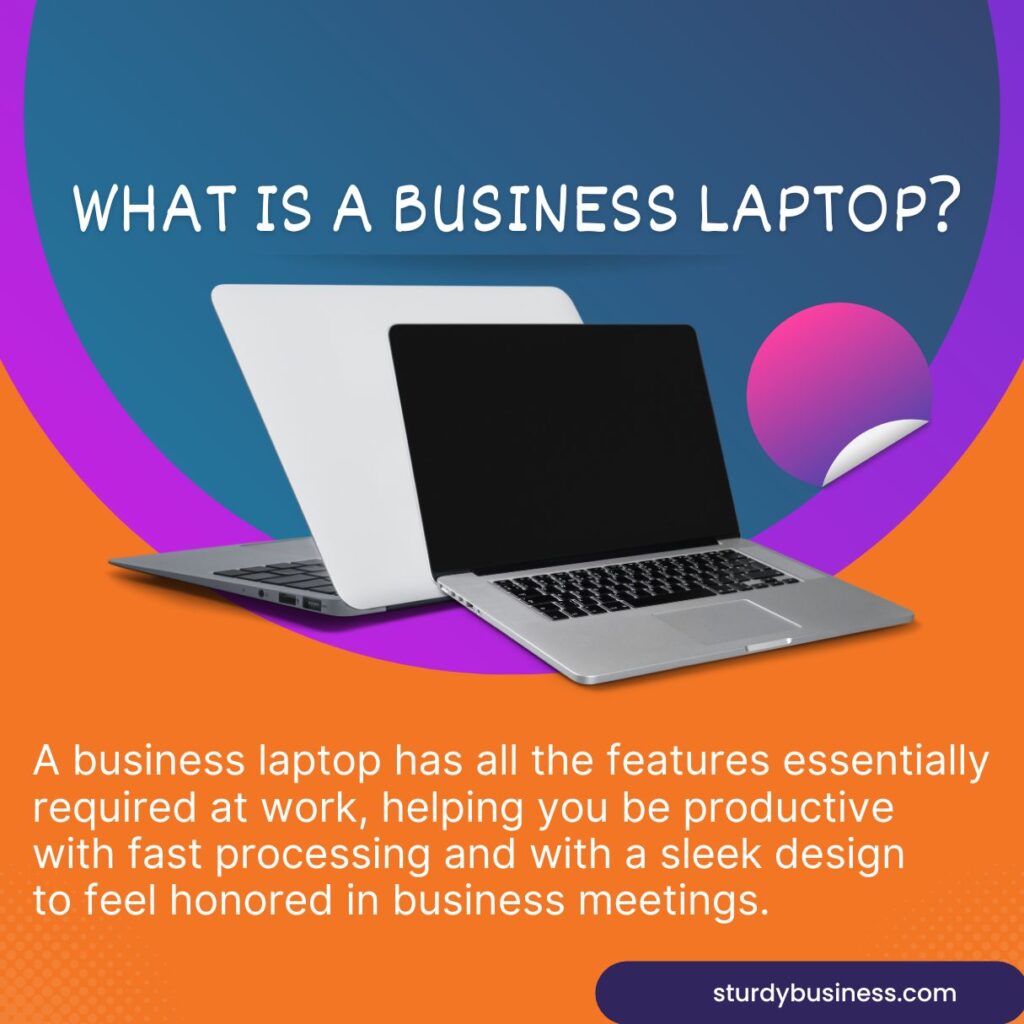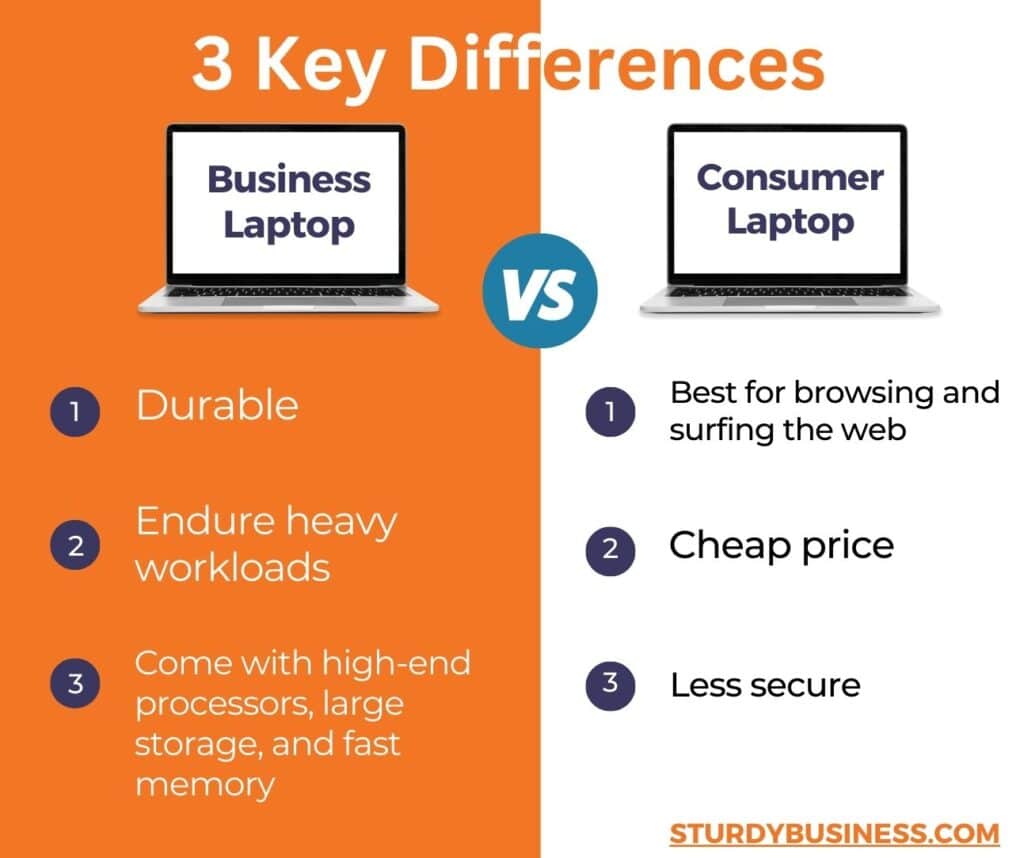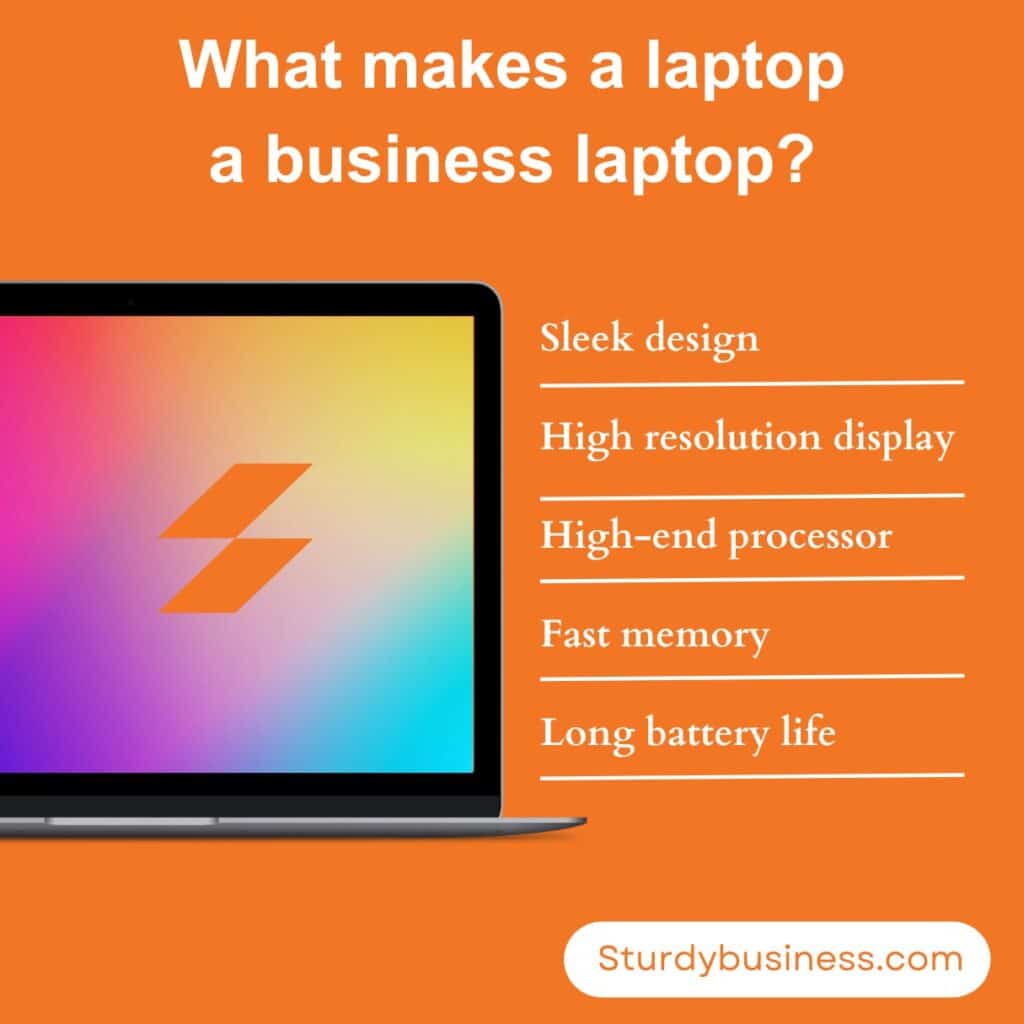When buying a business computer, the first thing that comes to mind is, what is a business laptop?
Is this different from consumer or regular laptops? And can you use your home laptop for your business use?
There are tons of questions following this confusion, and you find it a mess to buy yourself a laptop for your work.
Seriously, even this happened to me multiple times a few years ago.
But.
Today, I shall answer all the questions that often come to mind.
So, if you are starting a business or have a running business and want to buy business laptops, here is what you must know.
On this page
What is a business laptop?
A business laptop is designed to come with all the features essentially required at work, helping you be productive with fast processing and memory and with a sleek design to feel honored in business meetings.
Additionally, a business laptop lasts long and has a long battery life with portability, so small business owners, hybrid and remote employees, and consultants can easily handle the machines in traveling.
And last long enough that you don’t often replace your machines.
Let’s elaborate on it.

Since no business ever wants to dispose of tons of laptops after a few years.
It takes thousands of dollars to buy business laptops for an office, and that’s a huge amount. You can’t pay it every year.
This is why business laptops are built to be durable, shockproof, and more secure than consumer laptops.
In this way, business laptops are way more different from consumer or home laptops.
Major differences between business and consumer laptops:
As business laptops endure heavy workloads for long hours, they are optimized in such a way as to satisfy the specs, i.e., they come with high-end processors, large storage, and fast memory; The features are hard to find even in the most expensive consumer laptops.
On the other hand, consumer laptops are manufactured keeping their buyers in mind. Mostly, consumer laptop buyers change their laptops rapidly – to keep up with the latest trend. This is why manufacturers compromise on the durability factor of regular laptops.

Also, the usage of consumer laptops revolves around surfing the web, watching videos, or playing games. Tasks that can be handled easily by a low-end processor.
So if you were wondering if you should use your home laptop for your business, here is the answer.
Regular laptops, for the reasons discussed above reason, are not ideal for business use. Because the level of workload business laptops requires cannot be satiated by regular laptops.
They simply are not productivity friendly.
Features that make a laptop a business laptop:
Now let’s understand what makes a laptop a business laptop. There are 6 business laptop brands that you can consider. But the important thing is the features. What features should you see when buying a laptop for your business?

These are some features that business computers provide:
Durability
Durability is the first and foremost feature to consider when it comes to business laptops.
You can’t think of a business laptop that can’t face the tough routine.
Unlike consumer laptops, business laptops have a metallic build and are optimized to endure occasional drops.
Also, business laptops are not meant to be upgraded frequently, so the durability factor elevates even higher degrees.
Additionally, keyboards are critical for professional and commercial laptops because most work is done through typing.
So even the keyboards can afford tens of thousands of hits.
Portability
Business laptop series are serious when it comes to portability because every laptop that a business owner owns has to be compact yet sturdy.
The prime reason is that managers, CEOs, and hybrid employees must travel a lot, and heavy laptops would be challenging to move around.
The sturdiness of laptops arises because some need to be carried to harsh places like factories, so the compact build isn’t the only thing needed.
The laptops need to be sturdy as well.
Processor:
Business laptops come with high-end processors.
Because the processor is as important to computers as the engine is to a car.
The primary role of a process is to process any data thrown its way.
If a machine doesn’t have a good processor won’t get you quick results, especially when it’s under heavy load.
For instance, you are at an online conference with your potential customer or remote team, and your machine isn’t responding as fast as you are taking things forward; how would you feel?
That’s why when buying a laptop, your top priority should be to go for machines with the finest processors.
In fact, the processor determines the overall quality of the usability of laptops.
Famous processors:
The most famous processor brands are Intel and AMD.
If you use laptops for regular browsing and emailing, the Intel Core i5 is fine.
But if your work involves technical jobs like coding and App development, go for higher-end processors like Intel i9 or AMD Ryzen 5000 series (or higher) in order to ensure smooth usability.
If you want to learn more about processors, we have an ultimate guide to choosing the right business laptop processor.
Memory:
If you have used a laptop for work, you might know the deal of juggling multiple applications.
And if the laptop was from the consumer series, you might be familiar with the pain of frequent buffering for hours on end.
With business laptops, wave the pain goodbye because business laptops are specially designed to make the work as smooth and as jerky-free as possible.
They rectify these shortcomings by introducing large-sized RAM (also known as memory).
RAM (Random Access Memory) is the short-term memory of storing the information you are currently working on. Such as the number of tabs you have opened while the spreadsheet you’re working on or the SaaS or products you’re using along with.
In such cases, your laptop is dealing with multiple tasks simultaneously.
The memory handles this multitasking.
Don’t even look at 2GB RAM for business laptops. Ideally, 8GB or 16GB is pretty good. But for heavy tasks like coding, go for even higher, like 32GB or 64GB.
Performance
First of all, you should understand what the performance of a business laptop is.
The performance of a business laptop means how fast and efficiently a laptop can handle business tasks.
To perform well, a laptop needs to be fast and compatible with all the features. That’s why it requires a fast processor, memory, and powerful graphics card.
Storage
Storage is the next big thing. First, you require storage for your system files and apps.
Then you need it to store your files.
So how much storage you need for your business machine depends on what you want to do on your machine.
Ideally, you should have more than 512GB SSD.
The only thing you should consider is to stick to the advanced faster storage type, which is the SSD storage type.
So solid state drive (SSD) helps your business laptop in speed and hence productivity.
Security
High-security features, especially fingerprint sensors, are standard for business laptops, which you rarely find in consumer laptop series.
Also, Windows business laptops are integrated with TPM (Trusted Platform Module). A technology that provides hardware security. It is a chip that includes multiple physical security mechanisms that protect the system’s data protected from malicious software.
The role of this added blanket of security is to ensure safety because the business data is vulnerable to theft and hacking.
Connectivity
Connectivity, in part, is described as how well other software and hardware communicate with the laptop. That is, the number of connections isn’t all that is needed; having a good connection is what is required.
As mentioned above, business laptops have other technical uses besides charging, which need at least ample connectivity options.
A business laptop needs numerous connections, including an HDMI port, USB port (for inserting multimedia cables), Wi-Fi, bluetooth, ethernet, etc.
Battery Life
Even the lowest-end business laptops come with long battery life. Specially designed for employees who avidly travel for business purposes. Business laptops give a bonus by extending the battery life to 4 to 5 hours.
And let’s get this straight battery life is one of the critical things to look out for.
Since what good are other specs if its battery life is below average? Since it is next to impossible for laptops intended for professional use to be connected to a switch after every few hours.
Price
When it comes to the price of a business laptop, all the extraordinary specs business laptops provide reflect their high price.
It’s possible that you can find small business laptops under $500, but those would be for routine office work.
For instance, those could be good laptops for Zoom meetings, emailing, dealing with spreadsheets, and using SaaS. Those won’t handle technical jobs and heavy loads.
The best case is choosing business laptops between the $700 and $1000 range. Those laptops are good enough for any business tasks.
But.
If you are a small business owner and want to get business laptops for your leading roles, the best is to pick one of the best laptops for small business owners.
Conclusion
Business laptops are the best to own not only for professional work but for general use too.
The specs it provides are unmatchable as well.
They are relatively faster, more secure, and have ample space. Business laptops often come with long battery life.
All these outstanding specs for only one drawback, i.e., due to all the best features, make business laptops expensive.
But you get what you pay for. So if you want to perform well and be productive at work, paying a few hundred bucks, more will pay off.